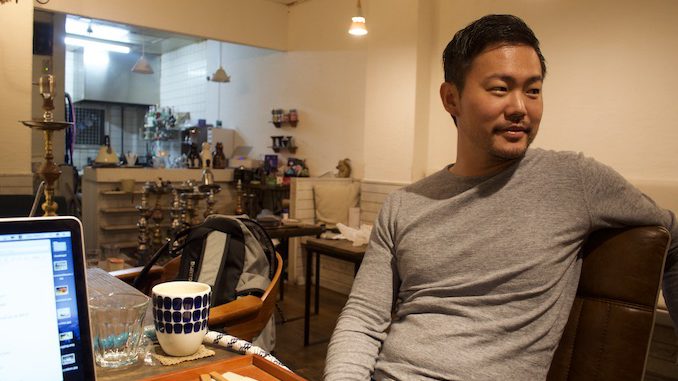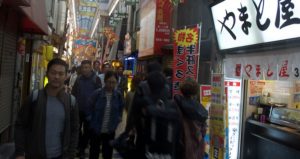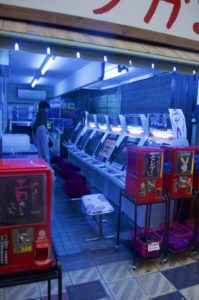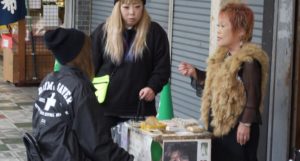
I met Ricky a year ago at an SPI networking meetup that he was leading. I knew from the start he was a smart and driven guy, and I was hoping to develop my network – so I reached out to him. In no time I was learning how important the concepts of supporting your friends and loyalty were to him as he selflessly came to events that I and others organized trying to develop our own businesses.

I asked Ricky to show me around his neighborhood. I met him under Tsutenkaku Tower in Shinsekai, Osaka. It was a great setting for the day. Ricky shared with me his knowledge of Shinsekai’s history – of how it was built around World War I – and he showed me all the shops both new and old. He showed me where the good cheap shops were where you could get kushikatsu at ¥50 a stick, and sushi shops that sold dishes with sets of 3 sushi rather than the normal 2. He also showed me Denden town, a famous electronics area in Osaka and told me of how he grew up buying toys and gadgets from these shops. Seeing it now with half the shops closed down, it was another stark reminder of Japan’s rise and fall during the bubble, and it’s struggle to rise yet again.
After walking around and seeing new hip Western cafes juxtaposed to run down old-school Japanese second hand shops, we settled in to his favorite local hookah bar. I told him I quit smoking (still going strong as of this writing), and after the bar owner brought over our meticulously prepared chai tea and hookah, we got into our conversation.
Let’s start from the beginning. Tell me about where you were born and your early years.

I was born on the fringe of Osaka City, quiet neighborhood, a little bit rundown, some rough kids here and there but not terribly. Since I was a little kid I always liked to read books, but mostly practical books like encyclopedias, dictionaries, and, you know, survival manuals – just learning all these facts. I always liked tinkering with things. It started with taking things around myself apart like a clock or whatever right. I liked to play with legos, I liked to build cardboard forts, and that eventually transformed into technology like gadgets and computers.
My mother was one of the first people to bring computer education for children, but her focus wasn’t on teaching kids on how to use computers and excel and all those kinds of things. In a sense she was trying to teach kids how to be creative, how to think logically, through the use of a computer merely as a tool. We had some assignments, some projects – rather fun ones – involving various software. This was way before all these IOT devices. I started learning on one of those old Macintosh computers.

I went to school here in Osaka for elementary and middle school, and after that I went to the US. It wasn’t entirely my decision to be honest. I was a kind of a fuck up in Japan, you know, in the sense that I never payed attention in school. I was always daydreaming, imagining things that I like to think about, or reading books that arose my own interest. Sometimes they aligned with what school expected me to learn like science and these things, but other things like math, Japanese, and kanji especially – god I was terrible at. I can read kanji but I can’t write kanji beyond my own name and a couple addresses. I have to look up everything.
I went to a kind of hippy high school in LA, California – only 250 students total. It was like this off shoot of this already hippy high school that got too big and too preppy, so some of the original people got together and built a new hippier school.
I remember one of the earliest things I learned about you is that you didn’t graduate from high school?
Nope haha. And this I haven’t told my parents about this yet. Meh~ if they found out I think they could care less. Well now, but had they found out a few years ago like 2 years ago they would be devastated.
It’s kind of silly but, first year of high school I was a fresh-off-the-boat kid. Second year, I was just struggling to adopt to my new life – learning English and catching up to the rest of the kids. Towards the end of 2nd year, and beginning of 3rd year, my English was okay and I was doing well in school. But then… I discovered there was more to life haha. I started kind of… I wasn’t hanging out with bad kids. They just liked having fun. I just started having a bit too much fun – started skipping school. One of my childhood heroes has always been Steve Jobs. In the back of my mind I was saying, “Hey man, Steve Jobs dropped out in university too. I don’t have to go to school, school is for suckers”. And consequently I failed one of my classes. I was supposed to make it up after graduation at summer school, but before that summer school finished, graduation came. The school was nice enough to let me attend, and gave me a diploma. I thought “I got my diploma, I don’t need to go to some stupid summer school”, so I dropped out only to find out many years later when I actually tried to go to university that I’m still technically a high school dropout.

After I came back to Japan, I didn’t know what to do, I just did nothing. Eventually my parents and uncle who run an electronics recycling business tell me “Ricky get out of the house. Work! Do something”. So he gave me a job working for his electronic recycling company. I repaired CDs, DVD decks, amplifiers – simple things. I did that for a year or two and saved up enough money to move into a guesthouse, because I wanted to be with foreigners and use my English and that kind of thing. Around the same time I started working temporarily as an intern for a small Osaka company which turned into my freelance client. It was a pet product company. They had like clothing for dogs and cats, and they needed a web or computer guy so I started working as their developer. I did that for a year or 2, until the recession came. I was being a dumb-ass. I basically got this awesome company that was paying me too much. They were paying me ¥20man for 15 minutes per week of work. So I got lazy. I started dropping all my other clients. And then the recession hit and eventually the company found out they were paying this guy too much money so they dropped me as their contract web developer and suddenly I had to work for my money. I did some odd jobs here and there – I worked at Bic Camera selling TVs and internet subscriptions, and applying at job agencies. One of them got back to me saying “sorry we’re in a recession, we don’t have any clients that are interested. But if you want to work as a recruiter we can hire and train you”. So that’s how I became a recruiter. I did work for that company for 3 and a half years. At that company you are supposed to have a university degree to be a consultant, but my boss liked me enough that he told me just to make up a diploma. That’s how I got promoted to consultant without a university degree.
It was very competitive and a salesy job. We were treating these people who were looking for jobs just like money bags with legs. So I started contemplating what’s next. This is not where I belong or where I should settle.
I decided I needed to get myself an education. I heard engineering was always in demand. Since I was born in Asia and spent some time in the US, I thought maybe Europe would be the next natural destination. I had interest for German design and German engineering and cars. That’s how I settled on moving to Germany.
I needed to pass a German language proficiency test before I could even apply to university. I got a working holiday Visa, and I studied German. And that’s really all I did for a year. I would study 10 hours a day, and then I spent the rest of the time doing house chores. I passed the German exam and thought “great, now I can start applying to universities”. That’s when I found out that I was a high school drop out.

That’s an amazing story… What did you do after that?
I spent a year living with my grandparents and I still had a client from Germany, but soon that client was gone and I was in a tough spot. I explored options in Japan, but man everywhere I applied I got shut down. I was wondering what to do and all of a sudden an acquaintance of mine from the guest house contacted me. He said he was looking for a guy like me who was relatively smart and could speak English and Japanese fluently. He started a company around finance and block chain. He saw I had an HR background so they hired me as a dual translator slash HR guy, and that’s how my general HR, not just recruiting, career started.
That’s when I learned to dread and love startup life.
Did you originally want to become an entrepreneur? Or was it just a natural progression?
I’d say it was a progression. I’d say it was a really weird curvy road, because as a kid I got bullied for being a rich boy. I didn’t really understand the concept of entrepreneurship but both my parents owned their own companies. Not strictly startups, but every member of my family started a business – my grandpa, my grandma, my mom and dad, my uncle. But I hated it because my parents weren’t around and I was bullied for it. I wanted to be the normal guy, go to normal school, graduate normally, and go to a normal company and be a salary man. But then in high school that all changed.
I was always a mac fanboy, so I read all these books about how Macintosh came around, how Steve Jobs was instrumental, and Steve Wosniak too. That inspired me. In junior year of high school my buddy studied his own online business. He just started a website and he put ads and he started making money. Initially it was $40-$50, that soon became $400, and that soon became $4000. And damn if he could do it, I could do it. That’s when I decided to teach myself how to program.
Could you see yourself ever becoming a normal company man now?
No way. I feel like I want to do my own thing. I don’t work well under people. Unless I truly respect what I do and who I work for. That sort of happened with the previous startup, but that didn’t end up working in the end.
After that I took over SPI. I had my own vision and idea for the disaster relief platform and I started to dive into the whole startup scene.
What drove you to enter the startup scene?

Money, I don’t care so much. I live very cheaply. I want some luxury here and there but I don’t care about owning a Ferrari anymore, you know. In fact I had well off parents so I’ve experienced all that – not well off to the extent of owning a Ferrari but you know. But what I want to do, is make a difference – give my existence some meaning. I don’t want to just exist. I want to do something with my life.
While I was working for the fin-tech company I had an opportunity to go to Kumamoto. There was a business trip in Fukuoka, and Kumamoto was close by. You know there was that big earthquake that just happened. I wanted to help. I’ve always wanted to help people, but never strongly enough to start my own initiative or volunteer. Basically, the fin-tech company was paying for me and all the expenses. I thought I might as well. But then, along the way I experienced a lot of difficulties. The first was finding correct and updated information. There’s all these different entities, government and private. They’re all acting individually, putting out their own information through their own channels. Number 2 was lack of good organization and business practices. Because these people are not specifically trained for that. When these disasters happen, you get a surge of volunteers and a surge of people who are asking for help, and I noticed they couldn’t handle it. One example I like to tell people is that, I went to the volunteer camp and they told me I couldn’t volunteer for that day. They told me I need to come before the deadline so that they could take down my information and they could split us into different groups and assign tasks for the day before they would send us off. So you need to come before the deadline. That was stupid. That’s when I came up with the idea – why don’t I replace these people talking on the phone and exchanging paperwork with a cloud platform.
My app essentially connects people who need help with those who are willing to offer to help. It’s peer to peer so there’s no bottleneck of having intermediaries, like these different organizations that are acting in that capacity in disaster affected zones. The information is centralized to solve the fragmented information problem of disaster relief efforts, but the platform as a whole is more decentralized, allowing people to help each other without relying on a central entity and eliminating a lot of inefficiencies.
How do you feel about entrepreneurship in Japan?

I would say it’s difficult, because most of the positive reactions I’ve received for my idea and in general has been from foreigners. You know, foreigners from overseas, expats that are living here short-term, but not so much from Japanese people. It makes me think Japan might not be so receptive to new ideas that includes the whole concept of entrepreneurship.
I pitched my idea to different people – VCs, social VCs, potential customers, potential partners, just anyone who is willing to listen to my idea haha. I attended several business competitions and I’ll be applying for more competitions and pitch events.
What was it like running SPI?
It was an international community of people, and a lot of people were excited and forward thinking. That appealed to me a lot. At the same time, I realized the community itself can be more. Partly because I noticed other communities were just not what they could be. They have to build a community. Community is not just a series of one-off events. You have to connect these people. Build a shared vision, shared goals, shared missions amongst these people, and get these people to work towards them.
What’s next?
I really don’t know. That’s the fun part and the tough part of the entrepreneurial story. You really don’t know what’s happening next. I’m still working on my original idea. At the same time I’m working on side projects, and seeing which one of them gets traction.
I just want my life to matter. My life view is that I don’t want to just exist. I don’t want to just go to work so that I can just earn money to make a living. Some people say that that’s what having a family is about. I mean sure, that’s great, but I feel I want to do more than just supporting myself and my family.
Last thoughts?
I get this question a lot and I think it’s an important one. People ask “Wow you have all these experiences, you have all these qualities. That’s why you must be an entrepreneur right?”. Well yes, that’s partly true, but that’s also just part of my circumstances. I wouldn’t be able to get a good job because of my lack of degrees. I’ve already hopped around all these jobs which is a big no-no in Japan. I wouldn’t be able to get a decent job other than to create one for myself. It’s a negative or passive reason. But it’s an important reason why I choose to pursue this. It’s not all roses and rainbows – the reason I pursue entrepreneurship. Yes, I want to realize my own ideas, and I have strong passion for it. But at the same time all these sort of negative circumstantial reasons are affecting my decision.
Reflecting on the conversation, my thoughts naturally led me to use Osaka and Ricky as metaphors for each other. A product of successes and failures, and the grit that comes as a consequence. They are both a product of their history and circumstances. But are we not all so? That’s like saying a person was born and lived a number of years. Nevertheless, knowing the directness and unapologetic frankness that come from both Ricky and from Osaka, I believe these histories and circumstances have a particularly different meaning – something you won’t ever quite get unless you walk these streets yourself.
For those who would like to reach Ricky, you can find him at www.i4humanity.com, or you can email him at ricky@i4humanity.com.

Leave a Reply